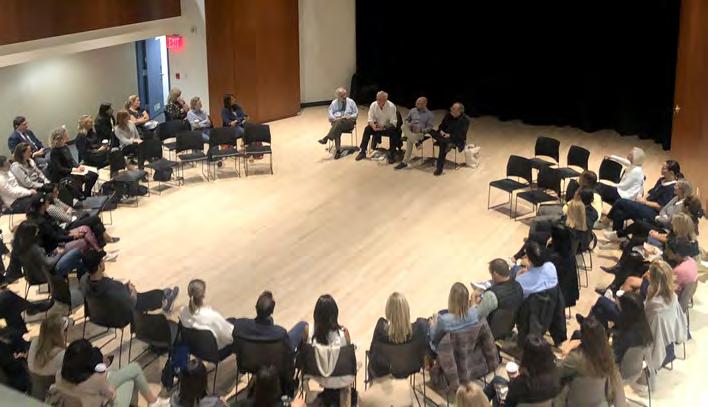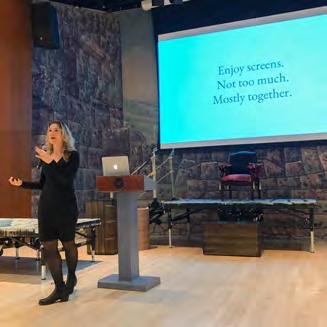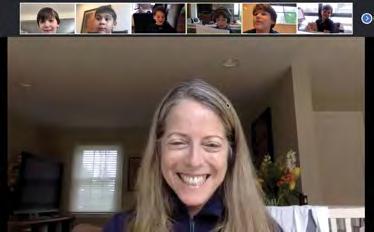
6 minute read
Parent Education
around A - S
Doctors Dialogues >
—Dr. Schwartzman
Parenting in Today’s World
Allen-Stevenson partnered with four doctors who have worked with the School and know the community well to offer a four-part doctors dialogue series titled: Parenting in Today’s World. Being a parent is both joyful and challenging at times. In today’s world, this role feels like it has become even more stressful and complex. The hope is that by discussing some of the questions and concerns parents have, parents, and thus students, will find themselves in a less stressful and anxious place.
Dr. Edward Corrigan touched on the importance of incorporating joyful playtime into a child’s routine. Reality, at times, can be overwhelming for children, so play provides an opportunity for them to deal with some of the harder aspects of reality. They can break situations down into smaller parts making them easier to process. Dr. Corrigan also pointed out that it is okay for children to be bored. It provides many opportunities for them to be creative and figure out things on their own.
Dr. William Dince talked about glitches that can appear at different stages in a child’s development. Sharing a Venn Diagram that highlighted the intersection of emotion, learning and attention with the sweet spot in the center, Dr. Dince explained that “School isn’t about the specific learning of facts. Students will learn what they need to learn if they are at the point where all three converge.” To avoid creating anxiety in children, “We need to remember that it is about them being great learners rather than about “a grade” or “a particular fact” being taught.” Dr. Benjamin Harris discussed the anxieties and complexities a parent faces as they respond to their child’s emotional concerns and challenges.
He talked about parents feeling the anxieties that come from observing their children. Sometimes parents react too quickly because they care so much rather than taking a step back and understanding the cause of their child’s struggles…and a parent’s reaction can be powerful.
“How we were as kids informs our children,” said Dr. Harris. “We are always filtering through our own experience,” added Dr. Schwartzman. The implications of this, Dr. Harris suggested, is that parents need to endeavor to understand themselves in order to understand their children.
For the last parent discussion, Dr. Michael Schwartzman talked about how our own experiences get in the way of how we raise our children. “What is done to us is part of us.” Dr. Schwartzman went on to explain that, “Often we get upset with our child because they bring out something in us that we don’t like, and it’s easy to blame this on them.” Parents take their own experiences and layer those onto their children’s experiences. “We need to ask ourselves where this is coming from.”
The doctors emphasized that as a parent you must first help yourself in order to help your child. Unless you know why you are reacting a certain way, you won’t be able to change your behavior and recognize where you are vulnerable.
Other advice shared included telling parents to allow their children to have failures. They pointed out that these are considered failures to you, the parent—

Parenting in Join us for 4 morning discussions on Today’s World
Topics Include: with Dr. Edward Corrigan, Dr. William Dince, Dr. Benjamin Harris and Dr. Michael Schwartzman.
OCT 16
Child Development Needs
Dr. Corrigan will focus on dilemmas parents face when their child’s developmental needs are out of sync with a parent’s understanding and plans.
NOV 13
Supporting Your Child’s Learning
Dr. Dince will discuss anxieties and concerns a parent faces as a child’s individual learning paths begin to develop.
JAN 15
FEB 19
Emotional, Behavioral and Social Diculties
Dr. Benjamin Harris will look at anxieties and concerns a parent faces as a child’s emotional style and needs unfold.
In昀uence of Our Own Experiences
Dr. Schwartzman will explore how we are in昀uenced by our own growing up experiences and personal needs and how this impacts our efforts as parents.
8:30-9:30AM Assembly Hall
“Parents’ fears today are organized around performance. Parents feel like if their children are performing at a certain level, this might protect them by giving them tools and giving them buffers. We have to allow our kids to
chart their own path.” —Dr. Dince
not real failures, but ones based on a definition of failure by you, the parent.
Dr. Harris mentioned that he works with a boys’ group as part of his practice. He asked this group of boys, “If you wrote a parenting book, what would you want to include that you would have your parents do?” The boys resoundingly said they wanted their parents to apologize when they made a mistake—to own what they did. When parents own their mistakes, it teaches the children that it is okay to make mistakes too.
Thank you goes to Dr. Schwartzman, Dr. Harris, Dr. Corrigan and Dr. Dince, who volunteered their time to share their expertise with our community.

Anya Kamenetz speaking at Allen-Stevenson
Visiting Speaker Anya Kamenetz Sparks Conversation on The Art of Screen Time
Our Parents Association and Library Tech Commons partnered to bring Anya Kamenetz, education correspondent for NPR and author of the book The Art of Screen Time: How Your Family Can alance Digital Media and Real Life to Allen-Stevenson. Fifth-grade boys and older with an adult chaperone were invited to attend along with parents and faculty and staff.
In this book, Ms. Kamenetz takes a practical approach to parenting in a world where screens are everywhere. In conducting research for the book, she surveyed a range of experts and fellow parents to learn more about how they manage screens at home, both for their children and themselves. Through her research and analysis, she comes to this conclusion: Enjoy Screens. Not too much. Mostly with others.
Parents came together the next morning to compare takeaways from Ms. Kamenetz’s presentation and to discuss how our Allen-Stevenson community can apply this new-found knowledge to make positive changes within our families and our community.
Among many topics, parents discussed using screens alongside children to create opportunities for conversation, bonding, and intergenerational understanding. For example, one parent voiced concern over her children playing video games with chat room features that allow discourse with other players. Another parent echoed her concern and said that she finds it helpful to sit down and play the game with her sons to “test drive” whether it is appropriate. This communal usage can also open the gates for ethical conversations if the video game contains sensitive content, like violence.
Ultimately, however, the group agreed that there is no right or wrong answer to the screen time dilemma that modern parents face. Children are unique individuals with different dispositions and self-regulation skills, and every family has different dynamics.










